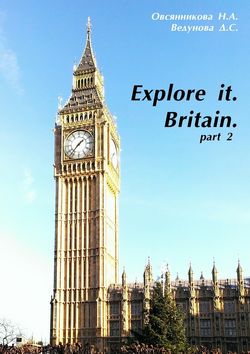Explore it. Britain. Part 2

Реклама. ООО «ЛитРес», ИНН: 7719571260.
Оглавление
Д. С. Ведунова. Explore it. Britain. Part 2
House of Lords
The British Parliament
House of Commons
Biography of Queen Elizabeth II
British royal family
UK Legal System
UK education system
Oxford
Oxford University
Cambridge
Cambridge University
Hastings
Exams and certificates
School uniforms in the UK
Football in Britain
Cricket
Rugby
Horseback Riding
Sailing in the UK
Tennis
Curling
Polo
Extreme sport
Holidays in the UK
Christmas
April Fool’s Day
Irish folk music
St. Patrick’s Day
Wimbledon
Guy Fawkes Day
British Library and Natural History Museum
The “Globe” Theatre
Отрывок из книги
The House of Lords, House of Lords, is the highest, or upper house of the UK Parliament. Also submitted to the Parliament includes in its membership the Sovereign and the lower house, sometimes called the House of Representatives or the House of Commons. Total House of Lords has a membership of 730 unelected members, namely: two archbishops, 24 bishops of the Church of England, which is called the spiritual lords, and 706 members of the Peerage, or secular lords. Lords Spirituals are the members of the House as long as they hold their spiritual position, the secular lords, are members for life. All members of the House of Lords referred to.
The House of Lords was founded in the XIV century and functioned almost always. Until 1544 the name “House of Lords” was not in use. From 1649 until 1660 the House of Lords did not function, because It was abolished by the government that came to power as a result of the English Civil War. Before historical moment the House of Lords had more weight and more meaning than election the House of Commons (the lower house). Nevertheless, from the XIX century, the distribution of forces began to change, and the time of the upper house of Nada much weaker bottom. An Act of Parliament passed in 1911 and 1949 ruled that all legislation excluding “money bills”, which includes the state budget, which passes through the House of Lords, may be detained for a period not exceeding 12 months, but it can not be rejected. In political science, such powers are called suspense veto, the veto deterrent. In addition, the legislative projects cannot make any corrections. The reform of 1999, House of Lords Act, abolished the right to inherit a place in the House of Lords. A small number of peers remain in place, that means the fact that they held high positions of the Great Officers of State, and an additional 92 are elected as representative peers. Additional reforms are included in the plans of the Labour government, but they are not currently unenforceable.
.....
Committees of the House of Commons: 1) Committees throughout the House (Committees of the whole House) represent the House of Commons in full, which is not a meeting held under the direction of the Speaker, as usual, and led by an elected chairman. This form of work of the House of Commons is used, as a rule, when deciding a constitutional matter. For example, when adopting the European Communities Act 1972 2) Standing Committees (Standing Committees) formed selection committee composed of 16—50 deputies to consider specific bills. Most standing committees are not specialized, but some of them are oriented in a certain way. For instance, legislative-earnment of the EU Committee, the Finance Bill, committees considering bills and other issues associated with Scotland and Wales, and so on. D. The number of standing committees is not restricted by law or the House of Commons rules, which may decide to set up Standing Committee for the consideration of any public bill. 3) Selected Committees (Select Committees) are formed from among the deputies, after consultation with the leaders of party factions and perform the functions delegated to them by the House of Commons. Selected committees are of four types: a) committees considering public bills or carrying out the examination on the most important matters dealt with in future legislation; b) committees considering private bills; c) the sessional committees, created at the beginning of each session of the House to deal with certain issues or perform the functions of a permanent nature. For example, the Selection Committee, Rules Committee, the Committee on Privileges, Committee on the procedure, according to the European Law Committee; The Committee on Public Reporting, g) committees to monitor the activity of ministries. They were first created in 1979 for the control of public authorities. Committees (a total of 14) working in close cooperation with the ministries. Areas of activity correspond to the functions of the ministries. For example, the Treasury Committee, the Committee on public reporting, etc. 4) Joint Committees of both Houses of Parliament, formed of their representatives, and posed for the consideration of non-political issues and some types of laws, such consolidated bills.
House of Lords – the second chamber of Parliament, which has its origin from the “Grand Council” (magnum
.....